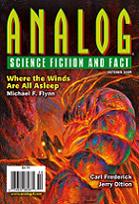 “Where the Winds Are All Asleep” by Michael F. Flynn
“Where the Winds Are All Asleep” by Michael F. Flynn
“The Hanged Man” by William Gleason
“Teddy Bear Toys” by Carl Frederick
“In the Autumn of the Empire” by Jerry Oltion
“Shallow Copy” by Jesse L. Watson
“An Idea Whose Time Had Come” by Robert Grossbach
“Cold Words” by Juliette Wade
Reviewed by Bob Blough
This is a solid issue for the longest running SF magazine in existence.
The longest story in the October Analog is Michael F. Flynn’s “Where the Winds Are All Asleep.” Like Clarke’s Tales from the White Hart or L. Sprague de Camp and Fletcher Pratt’s Gavagan bar series it is a fantastic tale told in a bar. This story framing technique goes back a long way and is used in many types of literature and has a wide variety of practitioners. The novella is set in an Irish pub that has obviously been used by Mr. Flynn as the setting in past stories as there are tantalizing characters that do not have much to do here but listen and comment on the scientific tale being told. The “bar tale” is told by a scientist who has been working on the “monogenesis problem” which questions if life had only one beginning or several through the years. The story follows a group of scientists who descend into the depths of the earth to find this “second genesis, a second tree of life.” They explore the depths and discover more than they bargained for. The framework of the story caused problems for me because it removes the reader one frame more from the core story since the main story is constantly being interrupted by comments from the patrons at the bar. This was obviously a conscience choice of the author but it placed it at too far a remove for me to become involved with any part of it. The scientific speculation is interesting, however.
The science fiction horror story also has many precedents – From Mary Shelley’s Frankenstein through Richard Matheson’s I Am Legend and beyond. Horror is fertile ground for the SF tale. “The Hanged Man” by William Gleason uses this genre to certain effect. A retired spacer is experiencing nightmares about a horrible act of betrayal on his part which caused the gruesome death of his friend and partner at the hands of the alien b’reath. In trying to ease those nightmares and atone for that betrayal he finds himself back at the alien’s planet where he left his partner. Atonement in this story takes on menacing connotations.
Recursion is the key to the virtual reality story “Teddy Bear Toys” written by Carl Frederick. A student, Neil, downloads all his daily life experiences into a computer for a teacher’s long-term project. This info is then used to render a simulation of Neil within the computer that generates stories that increasingly become more and more “prophetic” of Neil’s future. The story that the computer generates at the beginning of this novelette is so real that Neil isn’t sure what reality is and what is not. He begins to doubt that he himself is real. Is he, perhaps, just a construct within the computer? He questions whether he has free will or not. Does the generated story have to happen as written or can he change what seems to be his future scenario? The answer to these philosophical questions and what is really going on with the project are the underpinnings of the story.
“In the Autumn of the Empire” by Jerry Oltion is a short fable of an emperor with too much power and not enough intelligence. Wry and just the right length.
The creation of an AI takes on a scary situation which ultimately comes to a warm closing in “Shallow Copy” by Jesse L. Watson. Two boys, one a computer genius named Max, has created an AI without a personality or emotions He is convinced by his best friend, Will, to finish the job by downloading all of Will’s journals that he has kept meticulously throughout the years. In that way the AI will have the info needed to “become” a person with emotions and a personality. The narration is tricky as it begins with Will as a person and concludes with his doppelganger inside the computer. The situation is deftly resolved by the author.
AI’s are again the center of the next story. This novelette (a variant of Robert Silverberg’s 1971 award-winner “Good News from the Vatican,” wherein a robot becomes the new Pope) concerns the election of the first AI as President in a future USA that has almost become a third world nation. Robert Grossbach plays with this idea showing us both the good and the bad in “An Idea Whose Time Had Come.”
Rounding out the issue is a novelette that takes place on another planet and concerns the diplomatic endeavors of humans, wishing to build a spaceport on the alien planet, who are faced unknowingly with dealing with two different factions within an alien culture. Juliette Wade in “Cold Words” creates a very interesting and complex alien society that is based on an unusual caste system. The difficulties encountered in this diplomatic scenario make for enjoyable reading.